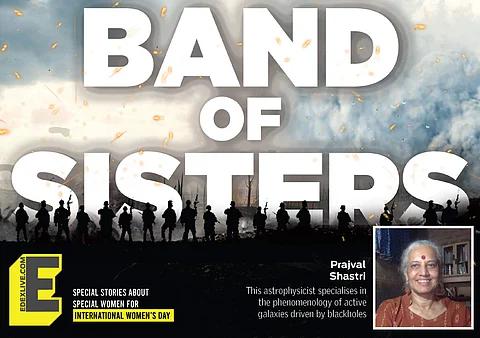

Rarely do women in India choose to study Science subjects like Astrophysics, Astronomy and so on. Not that they are less intelligent than men or lack the skills, but there are other reasons for it. One of them being gender discrimination in educational institutions. However, many women try to overcome these hurdles and achieve beyond our imagination. Professor Prajval Shastri is one such woman who has worked and researched extensively about black holes in the centre of distant galaxies.
We speak to this expert to know more about her journey in Science and the theory of black holes. Excerpts:
1. Tell us about your journey in Science and what led to take up research in Astrophysics.
I was born in Mangaluru and pursued a Bachelor's in Science there. My parents were Science buffs and they helped me read books and articles related to the subject. They would take me to different Science exhibitions and places where I could watch interesting experiments. I still remember one of the my favourite Science books, Atom, that had beautiful graphics and illustrated pictures of various experiments. One of the experiments from this book continues to remain my favourite. It is Ernest Rutherford's Gold Foil Experiment that explains the nuclear model of an atom.
Soon after BSc, I went to the Indian Institute of Technology in Mumbai to pursue an MSc and then PhD from TATA Institute of Fundamental Research. Initially, I thought I'd do my PhD in nuclear physics but when I joined this institute, I observed that there was a lot of research being done in Astrophysics. I was also an amateur astronomer from before. After my PhD, I went on to complete my post doctoral studies in the USA. I served at the Indian Institute of Astrophysics in Bengaluru for 23 years and I've been on this journey through Science for over three decades.
2. Your research is mainly about the giant black hole found in the centre of distant galaxies. The whole theory of black holes is taught in a complex way in classrooms. Could you simplify it?
Black holes are easy to understand if you know Albert Einstein's Theory of Relativity and the concept of Escape Velocity. Black holes are chunks of space or space-time from which light also cannot escape. I mainly studied how the black holes found in the centre of other galaxies interact and influence the materials passing through it. For instance, if a material comes close to the black hole, there are chances that it'll get sucked in by these black holes. But before that, they will swirl around and will be accelerated to high speeds and temperatures. This produces flames of gases around the material. While most of the materials just sink into these black holes, some of them get accelerated and energised by high temperature. Usually, stars and gases are energised and accelerated when they come close to black holes.
3. Why do girls loose interest in STEM after school?
No, I completely disagree with this. The Department of Science and Technology has programmes like Inspire Scholarship for Higher Education under which they provide a sum of `80,000 to pursue higher education in Nature of Basic Sciences. There are many girls who qualify for this fellowship than boys and pursue their higher education through this fellowship. Similarly, the Indian Academy of Sciences also offer various scholarships where we see many more girls winning scholarships than boys. However, we know that people within the institutions are gender-biased and they influence different thoughts in girls.
I am involved with a global organisation called India March for Science where we discuss current topics related to Science and the various developments around the world. A few months ago, we discussed the invisible hurdles in academia. And gender, caste, class, language discrimination in academia was one of the points of discussion. For instance, the people who teach these girls at institutions say that one has to work hard to pursue Science and it cannot be done while they manage a family. Such ideas force girls to drop out from pursuing Science or choosing STEM or subjects like Astrophysics.
There is a way to address these issues and the first thing is to train the teachers in institutions to understand how we must not perpetuate gender discrimination within the institutions. One has to make sure that all are given equal chance or opportunities so that they make choices for themselves.
